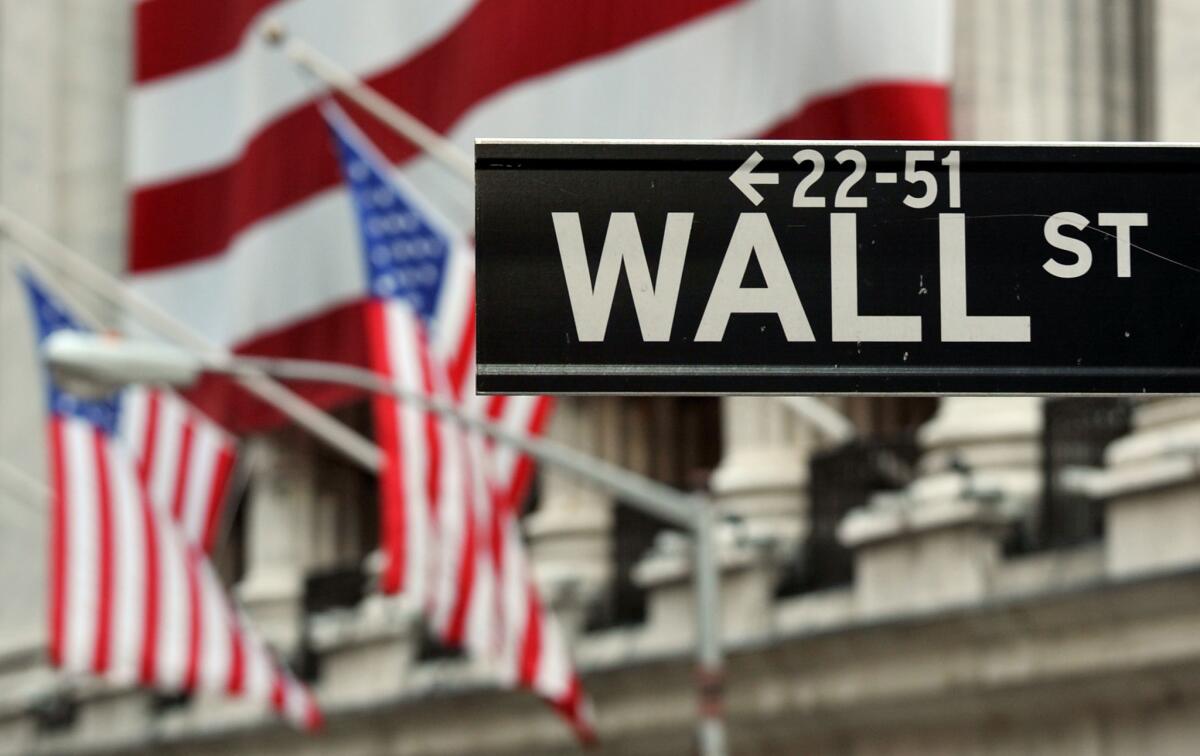Stocks falter under the weight of another oil-price collapse

- Share via
Stocks and Treasury yields dropped on Wall Street on Monday, but the market’s most dramatic action by far was in oil, where the price of a barrel of U.S. crude delivered in May plummeted to negative $37.63.
“I don’t think any of us can really believe what we saw today,” said Dave Ernsberger, global head of pricing and market insight at S&P Global Platts. “This kind of rewrites the economics of oil trading.”
The Standard & Poor’s 500 index fell 1.8% to 2,823.16 points. The Dow Jones industrial average slid 592.05 points, or 2.4%, to 23,650.44, and the Nasdaq fell 1% to 8,560.73 points.
Traders are still paying more than $20 per barrel for U.S. oil to be delivered in June, which analysts consider to be closer to the “true” price of oil. Crude to be delivered next month is running up against a stark problem: Traders are running out of places to keep it. Demand has dropped as factories, automobiles and airplanes sit idle around the world, and storage tanks are close to full. To unload the burden of figuring out where to store the oil that’s set to be delivered in May, traders became willing to pay others to take it off their hands.
Shares of oil-field engineering firm Halliburton lurched between gains and sharp losses, even though the company reported stronger results for the first three months of 2020 than analysts expected. The company said that the pandemic has created so much turmoil in the industry, it “cannot reasonably estimate” how long the hit will last. It expects a further decline in revenue and profitability for the rest of 2020, particularly in North America.
The longer the coronavirus crisis runs, the more profound the future changes in U.S. economic life. Globalism could go down, and consumer prices up.
The major U.S. indexes’ Monday declines ate into some of the big gains they have made since late March, driven lately by investors anticipating the potential reopening of businesses as infections level off in hard-hit areas. Pessimists have called the rally overdone, pointing to the severe economic pain sweeping the world and continued uncertainty about how long it will last.
“The government can declare whatever they want in terms of encouraging people to get out and do stuff,” said Willie Delwiche, investment strategist at Baird. “Whether or not broad swaths of society do that remains to be seen. It’s going to take seeing people start to get out and do stuff again. That will be the necessary positive development, not just declaring getting things open.”
More gains from companies that are winners in the new stay-at-home economy helped limit the market’s losses. Netflix jumped 3.4% to set another record as people shut in at home look to fill their time. Amazon rose 0.8%.
In a sign of continued caution in the market, Treasury yields remained extremely low. The yield on the 10-year Treasury slipped to 0.62% from 0.65% late Friday.

Stocks have been on a general upward swing recently, and the S&P 500 index just closed out its first back-to-back weekly gain since the market began selling off in February. Promises of massive aid for the economy and markets by the Federal Reserve and U.S. government ignited the rally, which sent the S&P 500 up as much as 28.5% from its March 23 low.
More recently, countries around the world have tentatively eased up on business-shutdown restrictions put in place to slow the spread of the virus.
But health experts warn that the pandemic is far from over and that new flare-ups could ignite if governments rush to allow ”normal” life to return prematurely. The S&P 500 remains nearly 17% below its record high as millions of U.S. workers file new unemployment claims every week.
Many analysts also warn that some of the the recent rally for stocks is due to expectations the economy will pivot quickly and rebound sharply once economic quarantines are lifted. Those could prove to be too optimistic.
“There’s still uncertainty surrounding the reopening of the economy,” said Julian Emanuel, chief equity and derivatives strategist at BTIG. “Come fall, are we going to be back on airplanes? Are we going to go out and eat?”
More to Read
Inside the business of entertainment
The Wide Shot brings you news, analysis and insights on everything from streaming wars to production — and what it all means for the future.
You may occasionally receive promotional content from the Los Angeles Times.










